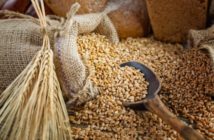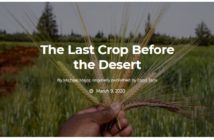By JENNIFER STEINHAUER
 THURMAN, Iowa — John Askew pulled at a soybean pod and revealed two anemic beans dappled with stem rot, the harvest of a too hot sun and too little rain. Representative Tom Latham peered in and shook his head.
THURMAN, Iowa — John Askew pulled at a soybean pod and revealed two anemic beans dappled with stem rot, the harvest of a too hot sun and too little rain. Representative Tom Latham peered in and shook his head.
“We need a farm bill — that’s the first thing,” said Mr. Askew, whose family has farmed here for six generations. Mr. Latham, a Republican, agrees.
But House leaders, including Speaker John A. Boehner, who popped into Iowa on Friday night to promote Mr. Latham’s re-election campaign, have been unable to muster the votes.
A summer drought that has destroyed crops, killed livestock and sent feed prices soaring is now extracting a political price from members of Congress, who failed to agree on a comprehensive agriculture bill or even limited emergency relief before leaving Washington for five weeks.
Farmers are complaining loudly to their representatives, editorial boards across the heartland are hammering Congress over its inaction, and incumbents from both parties are sparring with their challengers over agricultural policy.
In Minnesota, Senator Amy Klobuchar and her Republican Party-endorsed opponent, Kurt Bills, disagreed sharply in their first face-to-face debate over what a farm bill should contain. In Missouri, Senator Claire McCaskill and her Republican challenger, Representative Todd Akin, defended their positions before the state farm bureau’s political unit.
Representative Leonard L. Boswell, Mr. Latham’s Democratic opponent in a newly drawn district, said, “Every time I get out there, people keep asking me: ‘What happened to the farm bill? Why don’t we have a farm bill?’ ”
In Arkansas, the Democratic Party paid for an automated call by a farmer imploring rural voters to pester Representative Rick Crawford, a Republican, about the unfinished farm business. Representative Kristi Noem, Republican of South Dakota, took heat back home for backing away from a petition sponsored by Democrats that would have forced the House Agriculture Committee’s farm bill to the floor.
“We would have much preferred they pass the House bill,” said Michael Held, the chief executive of the South Dakota Farm Bureau. “I think the attitude here is this is typical Washington, D.C., not getting its work done.”
With a quarter of the country experiencing an exceptionally severe drought that is expected only to deepen, with the government projecting that much of the spring’s record corn planting will wither away, with significant damage to soybean and wheat crops and with prices for feed at record levels, farmers and ranchers are increasingly anxious about the gridlock in Washington.
“I am tired of our leaders doing nothing,” Mr. Askew said.
President Obama will begin a tour of this drought-hit state on Monday, an unusual amount of attention that underscores Iowa’s swing-state status. Mitt Romney visited Des Moines last week and addressed the drought.
While the most recently enacted farm bill will not expire until next month, disaster relief that would have helped some livestock producers cope with the high costs of feed and fodder lapsed last week. And with big disagreements in Congress over proposals to overhaul insurance and other provisions, farmers are finding it difficult to plan for any recovery in the next growing season.
Farm policy bills, which typically come up for renewal every five years, are usually built to attract bipartisan support by combining subsidies for farmers with allotments for food stamps and other nutrition programs that appeal to urban lawmakers.
But in a dynamic that has roiled the 112th Congress, this year’s farm bill was unlike any before it. While the House Agriculture Committee signed off on a measure, its substantial cuts to food programs alienated too many Democrats. And its cuts to those programs, as well as to some forms of farm aid, were not enough to appease the chamber’s most conservative members.
Republican leaders were unable to muster enough support for even a one-year extension of the law and instead passed a short-term drought-relief measure, the first time the House has failed to bring its own farm bill to the floor. The Senate, which had passed its own version by a healthy bipartisan margin, declined to take up the short-term House bill, and Congress left town in a stalemate.
The differences over food stamps are among the most profound facing this Congress, as the costs of nutritional programs have been growing rapidly and account for about $80 billion in annual spending. The Senate’s farm bill would cut $4.5 billion, and the House’s version $16.5 billion.
Representative Paul D. Ryan, the House Budget Committee chairman and newly anointed vice-presidential candidate, has recommended cutting $134 billion from food stamps over the next decade and turning the program into block grants to the states. Over the years, he has run up a complex record on farm programs, with votes for and against various bills, but has generally remained skeptical of subsidies and favorable toward fundamental changes.
Mr. Ryan is also scheduled to visit Iowa on Monday.
In the new Third Congressional District in central Iowa — a long stretch divided roughly equally among Republicans, Democrats and independents — the farm bill debacle leaves Mr. Boswell and Mr. Latham, both senior incumbents, in tricky spots as they fight for their political survival.
Many voters clearly want a bill that would provide ample crop insurance for farmers but scale back nutrition programs. On the other hand, plenty of voters in an area like Des Moines support a robust food stamp program. Some, like Mr. Askew, whose wife volunteers in a food bank, want both.
But having both is not what this Congress is about.
“I would like to see a farm bill on the floor, I really would,” Mr. Latham said. “I think you can find a sweet spot on food stamps and farm programs. Spending is an issue to people in this district, but there is also an understanding that people are in need.”
Mr. Boswell, who is a member of the Agriculture Committee, counters that Mr. Latham should press Mr. Boehner to push Republicans to take up the bill. “Mr. Latham is such a buddy with Mr. Boehner,” he said, “why doesn’t he tell him to bring the bill to the floor?”
In this and other breadbasket states, members of each party are quick to deflect blame to the other side for the impasse. “This bill is being held up by the same people who held up the debt ceiling last year,” said Bob Kerrey, who is seeking to regain a Senate seat he once held in Nebraska, where he joined Agriculture Secretary Tom Vilsack on Friday for a drought meeting and news conference. “They don’t want a farm bill.”
Republicans counter that Democrats should accept a short-term fix until the broader issues can be ironed out. “You know the president — he’s going to be here in a couple of days,” Mr. Boehner said at a fund-raiser for Mr. Latham. “Some of you might want to remind him when he comes that the House passed a bill last week to help those in the livestock industry.”
While some editorial boards have saved their wrath for Mr. Boehner or Democrats, many have simply denounced the entire process. Criticizing the Congressional recess, The Times Record News of Wichita Falls, Tex., wrote last week: “Emergency aid for ranchers and farmers was left on the table. Each side of the aisle blames the other, but the finger-pointing gives little relief to our own Texas ranchers and farmers.”
With little relief in sight on either the legislative or meteorological front, farmers are at the mercy of the whims of August. “We had five inches of rain the other day,” said Derryl McLaren, a corn and soybean farmer who met with Mr. Latham at a farm bureau not far from here on Friday. “And it’s all gone to hell anyway.”
.







